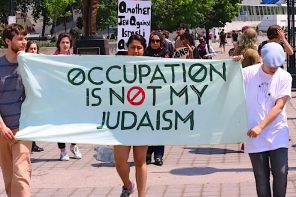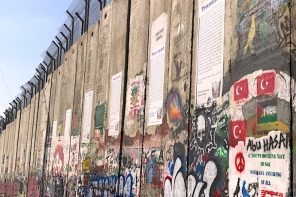By making Iranian President Mahmoud Ahmadinejad its keynote speaker, the United Nation’s Durban Review Conference, dubbed “Durban II,” lived up to the infamy of the original anti-racism meeting in Durban, South Africa, back in 2001 (which disintegrated into an anti-Semitic, anti-Western hate-fest that was abandoned by Israel and the United States). Representatives from dozens of nations streamed out of the hall in Geneva during Ahmadinejad’s speech calling Israel a “paragon of racism,” and railing against Zionist-controlled governments of the West. Still, I am determined to focus on the positive story: by imagining it.
I am imagining that the proceedings are not a mockumentary featuring a cameo by Ahmadinejad (who even before setting out from Tehran called Zionism the main source of racism in the world), but instead a Steven Spielberg production starring Nicole Kidman and Harry Belafonte. The conference is co-chaired not by Libya and Iran (who make every list of the world’s worst human rights abusers) but instead by Ben Kingsley, who for some reason is playing every Middle Eastern and South Asian character.
Can Anyone Name a Single Victim of Racism who was Helped?
In this counterfactual version, as with the actual draft of the conference “outcome document,” skillful negotiators have removed talk of restricting free speech to prohibit “defamation of religions,” [see Dacey’s March 30 “Religious Persecution Wolf in Anti-Defamation Sheep’s Clothing,” —ed.] as well as one-sided references to the Palestinian situation, both of which had been found objectionable by the Europeans and the other Western democracies. It also mentions what in reality would never be allowed by the Organization of the Islamic Conference, the powerful voting bloc that rules the Human Rights Council: discrimination against women and gays in Islamic states.
Yet even in the most favorably revised of screenplays, in which all the fondest hopes of Durban II’s sympathetic critics are realized—and Don Cheadle suddenly takes the floor during the closing session to make an impassioned plea to end another African genocide (when in fact the UN’s human rights apparatus has only gently slapped Sudan on the wrist while congratulating them for their “cooperation” with investigators)—the central story flaw would remain: the Durban process is not really about fighting racism and discrimination, over which it of course has no real power.
When all is said and done, Durban is an exercise in symbolic political speech that is not legally binding on member states. As the nongovernmental organization UN Watch had the insolence to ask at a preparatory meeting in March: “can anyone name a single victim of racism who was helped by the 2001 conference and countless follow-up committees?”
Anti-Racist Treaty Goes Too Far
For nearly 40 years the International Convention on the Elimination of All Forms of Racial Discrimination (ICERD) has existed as an enforceable international treaty on racism and related forms of intolerance and discrimination. If this treaty has failed to compel signatory states to act against intolerance and discrimination, why should we expect Durban to succeed, even under the best of circumstances?
The truth is that the ICERD already goes too far in its efforts to curb hatred, calling for criminal penalties for the “dissemination of ideas based on racial superiority or hatred” and the participation in organizations that “promote and incite racial discrimination.” Although the United States ratified ICERD in 1994, it made a so-called reservation that exempts it from these illiberal requirements:
The Constitution and laws of the United States contain extensive protections of individual freedom of speech, expression and association.
Accordingly, the United States does not accept any obligation under this Convention, in particular under Articles 4 and 7, to restrict those rights, through the adoption of legislation or any other measures, to the extent that they are protected by the Constitution and laws of the United States.
Political Cudgels with which to Pummel the West
The United States chose to boycott Durban II not just due to the replay of anti-Western rhetoric, but because the new declaration reaffirms in toto the 2001 text, which urged states to abide by ICERD. What’s more, the text calls for an elaboration of existing international standards in order to keep pace with new forms of intolerance (read “Islamophobia”). Now the Algeria-chaired Ad Hoc Committee on Complementary Standards, under the influence of the Islamic states and their African allies, is seeking to add to ICERD a protocol that would outlaw religiously offensive speech as “incitement.”
This is the real action that’s taking place behind the scenes, and it will continue after the curtain has fallen on the melodrama in Geneva. Equating faith and race, conflating religious criticism with bigotry, several Islamic states and their allies are fashioning new political cudgels with which to pummel the West.
The Europeans may not like these developments, but they will be handicapped in resisting them because their own regional human rights courts have ruled that international guarantees of free expression may give way before national legislation banning hate speech, Holocaust denial, and blasphemy (against Christianity).
For this reason a civil libertarian, First Amendment approach is all the more relevant, and the new US administration’s posture of assertive engagement at the United Nations is all the more welcome. When it comes to freedom of expression, the Obama era may see a narrowing of the policy gap between Europe and the United States; not because the Americans have finally come around to the European position, but because the Europeans are beginning to realize that the Americans may just have gotten speech right.
Together can they wrest the levers of the UN human rights machinery back from this coalition of authoritarian regimes? We had all better hope so, unless we want to keeping watching this movie.



